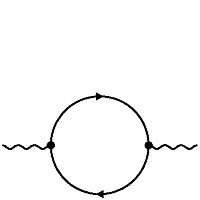By reading this: "https://physics.stackexchange.com/questions/81943/can-two-photons-annihilate" and answers to that question, I have came to strange question - Does annihilation in principle is different than a pair production process ? My intuition says that at least energy boundary conditions needed for pair-annihilation and pair-production should be different. That's why we need LHC collider to form more interesting particle pairs. But reverse process - annihilation - should go much easier at lower energy levels, isn't it ?
But, if we for example take a Feynman diagram of two photon decoupling into fermion-antifermion pair :

we can find a somewhat similar process, only involving just 1 photon in quantum vacuum fluctuations:
Given that vacuum fluctuations are spontaneous process, then 2-photon breaking into fermion-antifermion pair doesn't seem to have a high energy requirements too. This may show that not necessary for a pair production we need high energies. And if low energy is enough sometimes, then How to differentiate a pair-production from two interacting particles from a pair-annihilation ? (If it's different at all). That's the main question, second is that I still haven't understood - Do a pair of photons annihilate or not ? Thanks.

